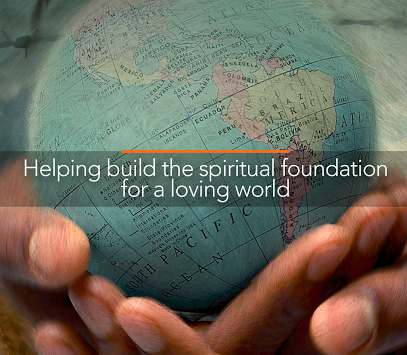As I pass by on the bike, a junior high school girl, accompanied by three boys her age, shouts at the top of her lungs: “I don’t give a fuck about life!” I’ve been hearing a lot of sentiments and language like that since the election, especially from girls.
 I’ve had occasion recently to interact with a powerful, though not widely known, philanthropic organization in my native state of Michigan, the Fetzer Institute. It provided an eye-opening window into the world of money and power, and how the status quo that is destroying the hearts and minds of America’s young people is sustained.
I’ve had occasion recently to interact with a powerful, though not widely known, philanthropic organization in my native state of Michigan, the Fetzer Institute. It provided an eye-opening window into the world of money and power, and how the status quo that is destroying the hearts and minds of America’s young people is sustained.
The motto of the Fetzer Institute is “Helping Build the Spiritual Foundation for a Loving World.” Since the spiritual and inward dimension underlies the intellectual and philosophical dimension, which in turn underlies the social and political sphere, this sounded promising.
The word ‘philanthropy’ comes from the Latin, ‘philanthropos, meaning ‘loving people.’ Fetzer, it turns out, loves the façade of love and forgiveness. I was put off, fobbed off and finally blown off by these lovers of humanity.
Fetzer has a good line, and lots of money. Their soothing mission statement reads: “We are living in a time of great transition. Our planet is stressed, and many of our institutions and systems are failing. Such times can contribute to alienation and despair, conflict and fear. But they can also be a time for hope, renewal and creativity.”
“At Fetzer, we too, are affected by this time of transition. For us, a bright future hinges on whether we, and enough of our brothers and sisters around the world, can truly open our hearts in love.”
Love and forgiveness are easy words to throw around, especially if you have a 500 million dollar endowment behind you. But Fetzer’s love is no different than CNN commentator Van Jones’ “Love Army” schlock.
“Tight around Trump is a little hate army – not every Trump voter – but tight around him is a little hate army of very cynical, nasty people who took over our government. We have to build a massive Love Army that can take the country and the government back in a better direction. That is completely doable.”
I don’t know what the hashtag is, but that kind of hash makes me gag. I also don’t know if Fetzer is helping to fund Jones’ “Love Army,” but it operates at the same level.
Fetzer has done some good. It has “supported reconciliation projects in Colombia, Rwanda, and South Africa, and funded development projects in the US such as Camp Abilities, a New York-based sporting camp for visually impaired children.”
Eric Nelson, who worked as program officer at Fetzer for 22 years before being fired in a wave of restructuring under a new president, displayed a surprising lack of rancor. The new president was himself soon fired…I mean “given a golden parachute and a consulting position,” which is how corporations work in America.
“Fetzer is a very fickle organization,” Nelson said, “changing focus every few years because they get bored with things.” The new president, Robert Boisture, “is a lawyer, a very logical, linear-thinking person who doesn’t care much for the spiritual dimension, which he feels is too soft.” So much for their “helping build the spiritual foundation for a loving world” shtick.
This was confirmed when I asked Amy Fergusson, Fetzer’s communication director, if she felt there was anything beyond the mind of man. In an unguarded moment of honesty, she said no. Then, realizing the implication for the institute she represented, she reversed herself and said yes. The American way, having things both ways.
Not surprisingly to the cynics out there, it turns out that the Fetzer Institute is as insular, self-concerned and devoted to maintaining the status quo of the society that gave rise to it as any other corporation.
Planning a visit to family in Michigan, with close relatives in the Kalamazoo area, where Fetzer is located, I contacted Fetzer after talking with a former program officer now living in California, Tom Callanan. I have an offer from the Earth Charter Initiative and UN-mandated University for Peace in Costa Rica to spearhead dialogues on the question: “Psychological Revolution and the Emergence of an Effective Global Polity?”
Given the imminent collapse of Pax Americana and the post World War II international order, and the shock and dismay Fetzer’s Ferguson expressed about the presidential election, it initially looked like they might be a good fit. I could not have been more wrong.
Unless you’re a spiritual celebrity, Fetzer requires you to come on bended knee, and engage in a long and careful stroking process. That’s the way the philanthropy game works in the United States, and perhaps everywhere in the West. If urgent response is required, forget it.
As Callanan, who worked for Fetzer for 16 years before being fired in the same get-rid-of-the-old-blood phase, said (also without rancor):
“I spent 16 years in the philanthropic sector at the Fetzer Institute with the hopes that I could use my privilege as a lever for some kind of valuable social change. I know that I did some good during that time, but there was much frustration and question about whether it was real change or not. Was I just playing some convoluted game to prop up the status quo?”
“I unfortunately believe that much of the work that foundations do in this world is merely this. And it’s very dangerous because it makes people believe that they’re actually doing something.”
Martin LeFevre


1 comment
Haha. This article is pretty close. I worked there.